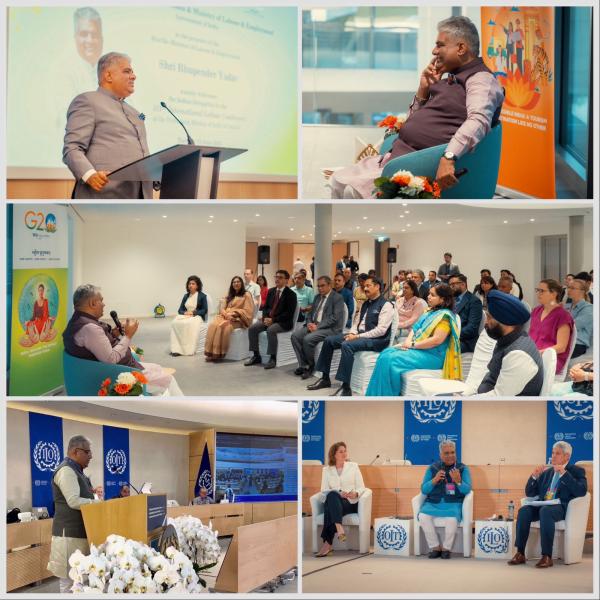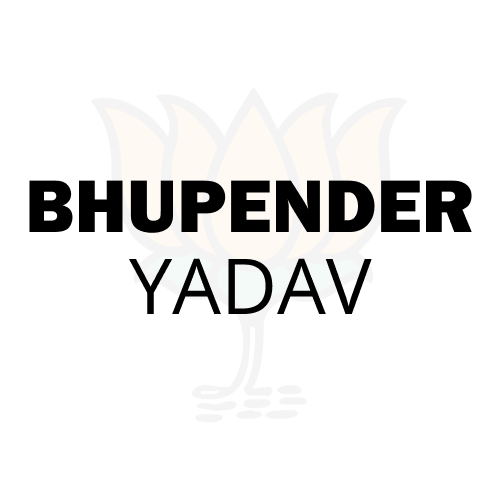
International Labour Conference: World commits to ensuring Social Justice for All
16/06/2023
BLOG
The 111th Session of the International Labour Conference held from June 5-16, 2023, has drawn to a close. Each Member State was represented by a delegation consisting of two government delegates, an employer delegate, a worker delegate, and their respective advisers.
I participated in the session from June 13-16 along with a team of very dedicated representatives and had very fruitful and enriching bilateral and multilateral engagements at the Labour Conference.
In his address in the Opening Plenary Session, Director-General of the International Labour Organization (ILO) Mr Gilbert F Houngbo stressed on the need to integrate the social agenda into all major international, regional and national policies and actions to fight growing economic disparities. He highlighted the need to build a Coalition for Social Justice to fight growing inequalities world over. Speakers representing Workers’ Union welcomed the concept of ‘Coalition for Social Justice’. They sought an integrated approach to achieve the objectives of social justice saying one-fits-all approach cannot work.
India too believes each country must chart its own course depending on its unique capacities and challenges.
Ministers/Secretaries of countries at the Conference outlined the measures taken in their respective countries for welfare of the workers. I, as a representative of India, was proud to share with Member States the scale and ambition of social justice that India has rolled out under the leadership of Hon’ble Prime Minister Shri Narendra Modi and the vision on which India is working to ensure our Shram Jeevis are ensured a life of dignity as we march towards Amrit Kaal.
In the plenary session of ILC, it was argued that migrant workers do not get labour as well as social protection like a local regular worker. And that Migrant Workers’ issues and labour issues should not be seen in isolation. Their contributions to the circular economy should be acknowledged and all labour and social protections should be extended to them like any other worker.
India, on its part, has acknowledged this and has been undertaking various measures to ensure the welfare of migrant workers both within the country and those moving abroad in search of work. The e-Shram portal is a unique database which is being seeded with information of workers spreading over more than 400 occupations. The database has been integrated with other portals to ensure workers get the benefits of social security irrespective of their work arrangement. Our new Labour Codes also are a step towards ensuring inclusivity and extending social security. I highlighted these aspects at the my remarks at the Plenary Session, the World of Work Summit, various interventions and bilateral negotiations.
The Indian Employees’ Delegate also, in his address, outlined on the enactment of four New Labour Codes.
World looking for ways to address inequalities
A lot of work was done by the Committees of ILC
For instance, the Finance Committee discussed:
- Programme and Budget for 2024–25,
- the scale of assessments of contributions to the budget for 2024, and
- the Financial report and audited consolidated financial statements for the year ended 31 December 2022
The Standard Setting Committee undertook the second discussion on Apprenticeships with a view to setting a new international labour standard in the form of a recommendation. The proposal was for consideration and adoption of a recommendation concerning quality apprenticeships by the Conference. India participated in discussions and supported by voting in favour.
In the Committee on Labour Protection, India made an intervention outlining the labour protection measures undertaken, especially through Labour Codes.
The International Labour Conference endorsed the ILO Guidelines for a just transition towards environmentally sustainable economies and societies for all (2015) which provides the central reference for policy-making and a basis for action. There was agreement that their implementation should be accelerated and scaled up through a reinvigorated framework for action consisting of four interrelated and mutually supportive elements namely:
(i) promoting inclusive, sustainable and job-rich economies;
(ii) advancing social justice;
(iii) managing the process of just transition; and
(iv) financing a just transition
World of Work Summit, 2023 of ILO
The World of Work Summit was convened around the central theme of “Social Justice for All”, on 14th and 15th June, 2023. It provided an opportunity to discuss and inform the proposal to forge a Global Coalition for Social Justice.
As part of the WOW Summit, four panel discussions were held with high-level representatives of governments and employers’ and workers’ organizations, UN entities and other international organizations. The themes of the panels were:
1) Addressing inequalities, informality and facilitating inclusion;
2) Fostering equal opportunities and full, freely chosen and productive employment for all through education, lifelong learning and skills development;
3) Jobs and social protection for just transitions;
4) Trade, employment and sustainable development: Advancing human and labour rights
I participated in the panel discussion on ‘Addressing Inequalities, Informality and Facilitating Inclusion’ of the World of Work Summit, held June 14, and underlined that under the dynamic leadership of Hon’ble PM Shri Modi ji, Indian governance is focused on the principle of Sabka Saath Sabka Vikas and addressing inequalities is central to policymaking.
I shared the success of the e-Shram portal, which is proving to be the foundation of “Amrit Kal for Garib Kalyan”. E-Shram is already available on Umang App and based on the data collected from the portal many schemes and programs can be designed to provide direct benefits to the unorganized workers of India. The main objective of e-Shram is to facilitate delivery of social security/welfare schemes to the intimal workers. The e-Shram portal has been integrated with the employment service portal, skill development portal and pension portal for informal sector workers, which will help such workers to seamlessly take these benefits.
I am leaving Geneva with a renewed commitment to work with greater energy towards Hon’ble Modi ji’s vision of Governance of Saturation by ensuring that in a changing World of Work amid challenges of digital transformation and climate change, our workers are enabled to use their potential to the fullest in building the India of Amrit Kaal, and that they are sufficiently rewarded for their efforts. Just like India is taking development and environment together, India is confidently taking workers’ welfare and employers’ ease of doing business together.
